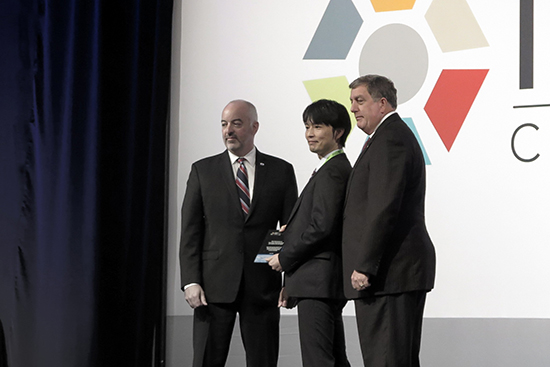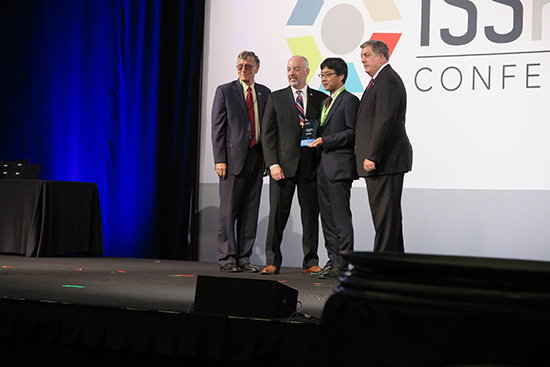This is an archive of information released in the past.
Disclaimer: It may contain broken links or outdated information. Some parts may not function in current web browsers.
*Visit https://humans-in-space.jaxa.jp/en/ for the latest information.

Experiment
- News
- Kibo Utilization Strategy
- Kibo Utilization Plan
- List of JAXA's Utilization Themes
- Experiment Facilities
- Space Environment Utilization
- Archive
"2018 ISS Award for Compelling Results" granted for experiments in JEM "Kibo" at ISS R&D Conference
ISS Research Awards
ISS Research Awards are granted for creative innovations and remarkable research results achieved on the International Space Station (ISS). The American Astronautical Society (AAS) selects award-winning research results from those nominated by the National Aeronautics and Space Administration (NASA), the Center for the Advancement of Science in Space (CASIS, an American non-profit organization), and international partners, and award-winners are granted ISS Research Awards at the ISS Research and Development (R&D) Conference, an annual event in the United States jointly staged by NASA, AAS and CASIS to present various activities on the ISS.
This event has been held since 2013, and forty-eight research themes have been granted ISS Research Award up to the end of 2017. This Award was granted several times to research results achieved by Japanese researchers in 2014, 2016 and 2017. In 2018, a total of seven research themes (of which two were those of Japanese researchers about utilization of Japanese Experiment Module "Kibo") were granted this Award.
The frequent award-winnings by Japanese researchers' themes among many other research themes related to utilization of the ISS show the level of utilization of the ISS by Japanese researchers.
Awarded research themes for Japanese researchers (Two themes)
| Theme | Compelling Results in Physical Sciences and Materials Development |
|---|---|
| Researchers | Shoji Torii (Waseda University), CALET Development Team (JAXA, NASA and ASI) and CALET International Science Team (Waseda University/Louisiana State University/University of Siena and INFN) |
| Grounds for Awarding (JAXA's summary) | |
The Award was granted for a great contribution to the advance of the space physics by obtaining high-precision data that could not have been collected from sites other than the ISS, through international cooperation involving Japan, the United States and Italy. 【Reference】 CALET succeeds in direct measurements of cosmic-ray electron spectrum up to 4.8 TeV |
|
| Theme | Compelling Results in Biology and Medicine:Transcriptome analysis of gravitational effects on muscles of mice |
|---|---|
| Researchers | Satoru Takahashi (Tsukuba University) and JAXA Mouse Epigenetics Team |
| Grounds for Awarding (JAXA's summary) | |
The Award was granted for a collection of data that may greatly contribute to the development of biology/physiology by breeding mice (including 1 G control) in space for the first time in the world and practicing sample sharing between Japanese and American researchers. |
|
Award Granting Ceremony

On July 26, 2018 in San Francisco, U.S.
From the left: Mr. Jim Way, AAS, Mr. Muneyuki Sato, JAXA, by procuration, and Mr. Kirk Shireman, NASA ISS program manager

On July 26, 2018 in San Francisco, U.S.
From the left: Mr. James Abrahamson, CASIS, Mr. Jim Way, AAS, Mr. Satoru Takahashi, Tsukuba University and Mr. Kirk Shireman, NASA ISS program manager
Award Winners' Speeches'
Mr. Shoji Torii, Waseda University
I feel a great honor to know that the CALorimetric Electron Telescope (CALET), a high-energy electron and gamma ray measurement device installed on the Japanese Experiment Module (JEM) "Kibo"/ISS, has been granted a "2018 ISS Award for Compelling Results" at an ISS R&D Conference of the American Institute of Aeronautics and Astronautics (AIAA).
I would like to take this opportunity to express my thanks to all those who have supported the development and operation of CALET, including the people from JAXA and companies concerned and the people concerned from Italy and the United States. I, among the CALET research team, am determined to continue the activities to come up with further scientific results while providing researchers in the world with high-precision data with CALET.
Mr. Satoru Takahashi, Tsukuba University
We are very pleased to know that our research using mice has highly been appreciated in the world level and has been granted an ISS Award. No experiment using mice in space has been carried out in Japan before us, so we had to make all steps groping our way. The strong support from JAXA and Mitsubishi Heavy Industries finally allowed us to complete the experiments successfully.
We are also pleased to know that the results of our research are contributing to anti-aging and health maintenance. We expect that the results of our research will form the basis for further experiments in space medicine and space biology by other researchers.
*All times are Japan Standard Time (JST)
| Copyright 2007 Japan Aerospace Exploration Agency | Site Policy |